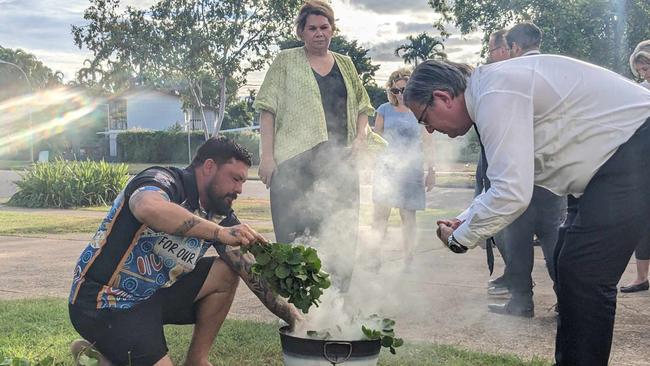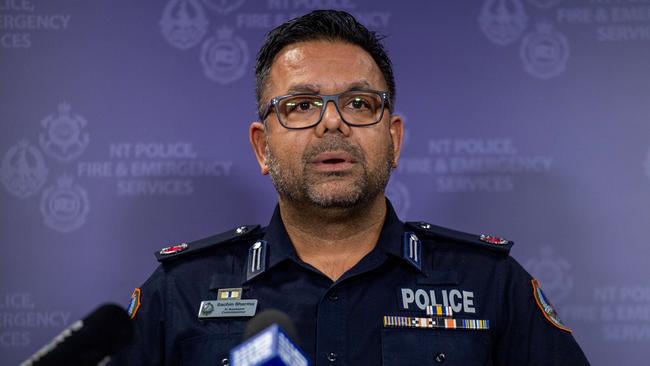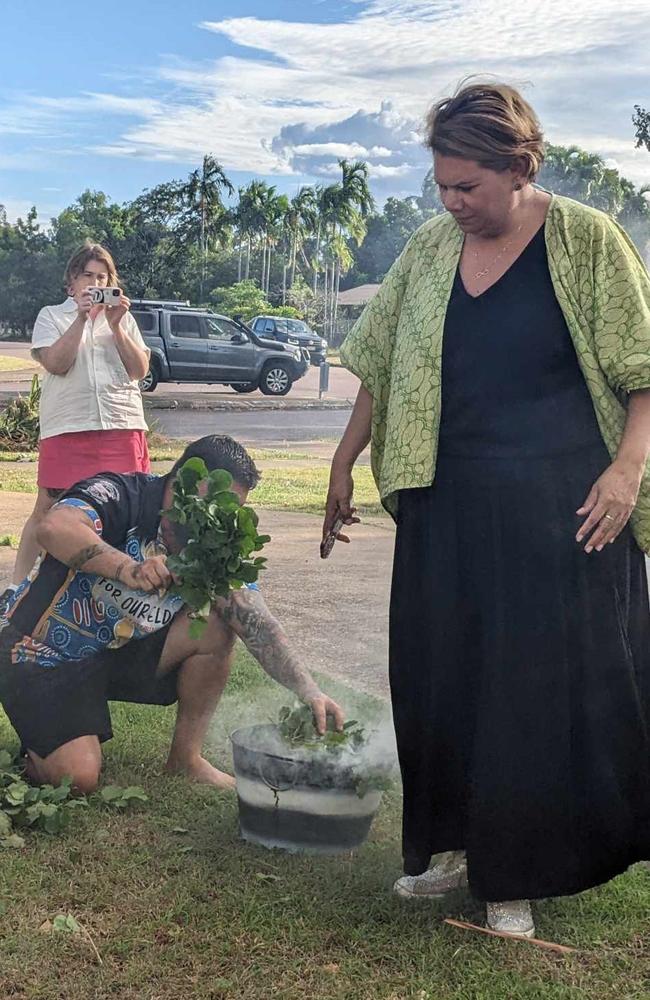NT Police misidentifying domestic violence victims rife, federal inquiry hears
‘The world around her is slowly disappearing’: Domestic violence advocates describe how Territory women are being trapped in a world of abuse, with police often adding to the danger.
News
Don't miss out on the headlines from News. Followed categories will be added to My News.
Territory cops are putting vulnerable women at risk by their failure to tell the difference between the victims of violence and perpetrators.
On Thursday federal senators in Darwin repeatedly heard that the misidentification of domestic abuse victims by NT Police was rife, resulting in abused women being put at severe risk of imprisonment.
Multiple experts told the public hearing into missing and murdered First Nations women and children that amid the chaos of a family violence incident, police were ill-equipped to tell the difference between perpetrators and victims of abuse, particularly when it involved Aboriginal women.

Domestic Violence Legal Service acting managing solicitor Zara O’Sullivan said while abusers could appear calm with “defensive injuries”, Aboriginal women were often not seen as the “perfect victim”.
Ms O’Sullivan said victims could be hysterical, intoxicated, have language barriers or were just unwilling to speak with cops.
She said her clients were then faced “arbitrary responses” from police, with their reports either dismissed or were put on “reciprocal” restraining orders alongside their abuser.
North Australian Aboriginal Family Legal Service principal legal officer James Lowrey this snap decision to lay a Domestic Violence Order placed women in real danger of being locked up.

“General duties police officers arrive at the scene after the heat of the moment has disappeared and they have to make a captain’s call,” Mr Lowrey said.
“(And) we are seeing our client base identified as perpetrators.”
Mr Lowry said while in other states DVO breaches often carried non-custodial sentences, 71 per cent of Territorians were sent to prison over breaches.
He said 20 per cent of all NT DVOs were against women and were not doing what they were designed to do in protecting women.
North Australian Aboriginal Justice Agency Kunga Stopping Violence program co-ordinator Rachel Neary told the inquiry 96 per cent of women locked up in Alice Springs were themselves victims of violence.
“Our clients will often tell us they feel forgotten and like they have disappeared,” Ms Neary said.
NT Police acting Domestic Violence and Youth commander Sachin Sharma acknowledged that police needed to improve their identification of perpetrators.

Mr Sharma said new domestic violence general orders and training was designed to reduce misidentification rates.
But domestic violence expert Chay Brown said overall police data around domestic abuse was “inaccurate” and “unreliable” due to the misidentification of perpetrators and the under-reporting of abuse.
The Tangentyere Council Family Violence Prevention Manager said the NT had a homicide rate seven times the national average, “among the highest rates (of DFSV) in the entire world”.
“But no one is keeping count,” Dr Chay said.
Despite 13 Territory women being killed by their intimate partners in between 2020 and 2021 — including one of Dr Chay’s own colleagues — none were officially recorded as domestic violence homicides in the National Coronial Information System.
Mr Sharma told the inquiry that a Domestic Violence Death Review was being established, which would remedy this.
Services repeatedly told the inquiry that without adequate funding, more women and children would be put at risk of ongoing violence and death.
“We’re calling crisis centres: Everyone is busy, everyone is full, no one is free and you end up sending your client to the long-grass,” Top End Women’s Legal Service chief executive Caitlin Weatherby-Fell said.

Ms Nearly said just last week one of her clients lost her eye after her husband beat her with a stick.
“While she’s not murdered or missing, the world around her is slowly disappearing,” she said.
Mr Lowry said while these women faced “complex” barriers, the “the issues in the NT are completely pedestrian”.
He said the NT was failing to meet four “base level requirements”: safe homes, interpreters, family dispute resolution methods instead of child protection, and men’s behaviour change programs.
An expert inter-agency report found $180m would be needed as a ‘minimum’ to properly fund domestic violence responses over the next five years.
Yet only $20m over the next two years has been allocated in the latest NT Domestic Violence Action Plan.
‘Dark truth’ behind missing persons investigations
The “dark truth” behind the Territory’s missing persons posters will be investigated in a federal senate inquiry.
On Thursday a senate inquiry into missing and murdered First Nations women and children will hold its first Territory public hearing in Malak.
Over 20 months the nationwide investigation has asked why so many Indigenous women and children have gone missing — with one common answer among the responses.
Frontline services, Aboriginal groups, legal experts, criminologists, NT Police and survivors have all called for action to address the “epidemic” of domestic violence believed to be behind many of these tragedies.
The NT Police submission to the Senate Inquiry said of the 75 Aboriginal long term missing persons cases, there were 11 women and six children.
It said there were 97 female homicides in the 21 years since 2000, with the NT coroner finding 81 per cent committed by an intimate partner.
The Central Australian Women’s Legal Service, Katherine Women’s Information and Legal Service, and Top End Women’s Legal Service declared that the NT was “at the epicentre of the DFSV crisis” with the situation only worsening.
Their joint submission said Territorians represented 30 per cent of all 390 First Nations women murdered in Australia in the three decades since 1989.

But an Aboriginal victim-survivor told the inquiry the homicide data did not tell the whole story of suffering.
“So many victims of domestic and sexual violence are not here today to tell their story, my
Mother was one of them,” the unnamed woman wrote.
“So many women die at the hands of their perpetrator, they lose their lives through addiction or they complete a suicide.”
The North Australian Aboriginal Justice Agency said several coronial inquests had found a common history of violence and sexual assault among unsolved cold cases and suicides in the NT.
“The data on murdered Aboriginal women and children in the NT does not even come close to depicting the dark truth,” it said.
“Repeat coronial inquests, repeated findings, and repeated lack of substantial action will only mean repeat disappearances and murders of Aboriginal women and children.”
The Northern Territory Council of Social Services said a major factor was the “structural inequality and racism” embedded in NT Police interactions with Aboriginal women, leading to 82 per cent of victims not reporting their abuse.
“Aboriginal women report both under-policing as victims and over-policing as offenders,” it said.
The Office of the Children’s Commissioner submission said in 60 per cent of reported harm against children, domestic violence was a contributing factor.
The OCC said children had repeated raised their concerns about witnessing violence, with an 11-year-old girl telling the watchdog: “Too much fighting is a problem. Parents are fighting, kids too much watching the violence”.
The senate inquiry begins at 10am, April 18 at the Darrandirra Child and Family Centre, Malak.
More Coverage
Originally published as NT Police misidentifying domestic violence victims rife, federal inquiry hears





